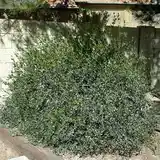Rare to find jojoba, simmondsia chinensis seeds - edible oil, λάδι












- Condition: New
Rare to Find Jojoba, Simmondsia Chinensis seeds - Edible Oil, Λάδι
Please note that the listing is for 15 seeds per each quantity.
Wonderful seeds of a rare shrub from the Sonoran desert of southern Arizona New Mexico south into Mexico, will be a great addition to your collection of edible oil shrubs.
15 seeds per package.
Plant Description
Edible Fruits, Attracts Birds, Wildlife Food/Shelter, Heat and Drought Tolerant, Long Lived, Desert Shrub, Xeriscape Shrub
Native to the Sonoran Desert (Soutwest Arizona, California, Northern Mexico and Baja California), Jojoba is an evergreen shrub that slowly grows 4 to 12 feet. It is a dioecious perennial, (separate male and female plants), with smooth, gray-green leaves. Leaves are oblong and leathery with an upward growth habit. Jojoba is long lived, having a life span of 100 to 200 years. This is a very drought tolerant shrub which performs well in the Southwest where temperatures are quite mild. The evergreen foliage provides year-round food opportunity for many animals, especially deer, javelina, bighorn sheep and livestock. Nuts are eaten by many animals, including squirrels and other rodents, rabbits and larger birds. However, only Bailey’s pocket mouse is known to be able to digest the wax. In large quantities, the seed meal is toxic to many mammals and the indigestible wax acts as a laxative in humans.
Jojoba produces an edible oil from its fruit. Jojoba is grown commercially for its oil, a liquid wax ester, extracted from the seed. Indigenous Native Americans in the Sonora and Baja California used jojoba seed and oil for cooking, hair care and for treatments of many medical problems such as poison ivy, sores, wounds, colds, cancer, and kidney malfunction. Seeds may also be boiled to make a well-flavored drink similar to coffee, hence the name Coffeberry.
Jojoba is unique among plants in that its seeds contain an oil which is a liquid wax. Oil of Jojoba is obtained by expression or solvent extraction. It is light yellow, unsaturated, of unusual stability, remarkably pure and need not be refined for use as a transformer oil or as a lubricant for high-speed machinery or machines operating at high temperatures. The oil does not become rancid, is not damaged by repeated heating to temperatures over 295°C and requires little refining to obtain maximum purity. Jojoba oil can be easily hydrogenated into a hard white wax, with a melting point of about 73°–74°C and is second in hardness only to carnauba wax. The oil is a potential source of both saturated and unsaturated long-chain fatty acids and alcohols. It is also suitable for sulfurization to produce lubricating oil and a rubber-like material (factice) suitable for use in printing ink and linoleum. The residual meal from expression or extraction contains 30–35% protein.
Leaf: simple, oblong, coarse, leathery, blue-green, to 2.5inches long; distinctive stiff, upward orientation to leaves, in pairs.
Flower: Dioecious (separate male and female plants), small clusters of yellow flowers. Flowers are apetalous (no petals), the female ones usually solitary in the axils, the male ones clustered with 10 to 12 stamens per flower; female flowers have 5 soft and hairy greenish sepals.
Fruit: Only on female plants when males are also present; 1inch oval, brown, nut-like berries that split open when ripe.
Other Names: Goat Nut, Deer Nut, Pignut, Wild Hazel, Quinine Nut, Coffeeberry, Gray Box Bush
Zone: 9 to 11 Cold tolerant to 17 degrees F. This plant cannot take hard freezes.
Growth Rate: Slow
Plant Type: Broadleaf Long Lived Evergreen Shrub
Family: Simmondsiaceae
Native Range: Southwestern United States and Mexico
Height: 5 to 8 feet
Spread: 5 to 10 feet
Bloom Time: Spring
Bloom Color: Yellow
Sun: Full Sun
Fall Color: Evergreen
Drought Tolerance: High
Water: Low
Maintenance: Low
Site Requirements /Soil Tolerances: Prefers dry soils. It likes full sun, no water after established. If your ground freezes regularly forget this plant. It needs rock mulch if you live in an area that has extreme summer temperatures and no summer rain.
Culture: Jojoba plants produce flower buds on the new summer growth. The plants must experience a certain number of chilling hours, after which the buds will mature and open in response to a late winter rain.
Uses: Hedge, street medians, privacy screen, valuable agricultural plant for oil (from berries).
Family: Jojoba (Simmondsiaceae)
Hardy to Zones 8 to 12, otherwise grown as a potted plant and brought in for the winter
(Goat Nut, Pig Nut, Coffeeberry) Perennial, evergreen, dioecious, woody shrub native to the Sonoran and Mojave deserts, growing to 6 feet and preferring full sun and very dry conditions. Excellent potential as a crop grown in marginal lands. Can be grown in potted culture. Protect from frost. Seeds are a source of liquid wax known as jojoba oil, a.k.a. vegetal whale oil. Valuable in cosmetics and in medicine. Sow seeds 1 inch deep in very well drained soil and keep barely moist and very warm until germination, which takes 20 to 30 days. Work up in pots and transplant out 5 to 15 feet apart.
BEAUTIFUL Edible Oil plant :)
Similar ads




Check for updates in favorites section
